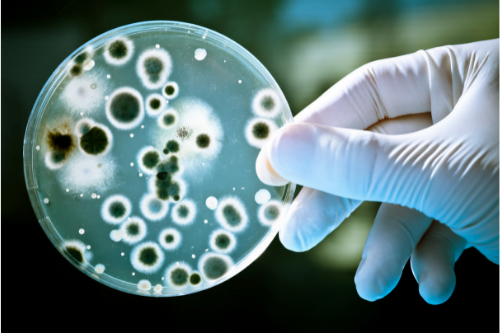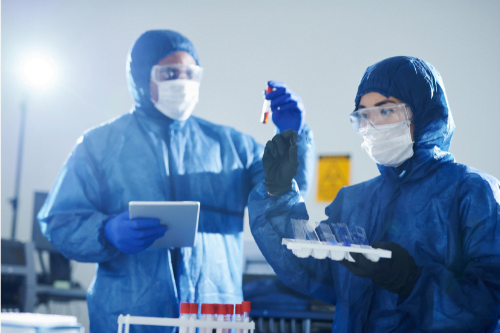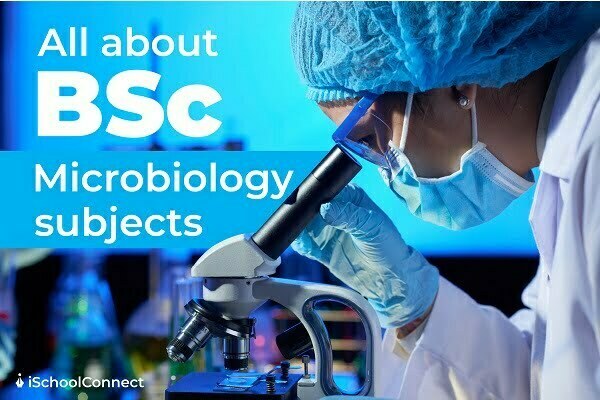Table of Contents
The job outlook and employment opportunities for microbiologists are projected at 5% between 2020 and 2030. This equals close to 2000 openings for qualified professionals in the United States alone. A recommended program to pursue remarkable employment opportunities in the field is a BSc Microbiology program.
Microbiology is the vocation of science that specializes in the study of – viruses, bacteria, protozoa, fungi & algae. These organisms have a profound influence on every aspect of our lives, including food, health & the environment.
Before we jump into BSc Microbiology subjects, let’s learn more about this field, shall we?
What is Bachelor of Science in Microbiology?

A Bachelor of Science Microbiology (BSc Microbiology) program is a 3-year undergraduate program. The syllabus of the program is designed with an emphasis on the study of unicellular & clusters of microorganisms. The effects of these microorganisms on the human body and the Earth are a crucial part of the program curriculum.
Microbiology is fast being recognized for its contributions to lifestyles across the world. Microbiology can also be considered an excellent preparatory specialization for students interested in-
- Medicine
- Dentistry
BSc Microbiology programs also come in 3 different types-
Regular BSc Microbiology program
A regular BSc Microbiology program is typically divided into 6 semesters, spread over 3 years.
Part-Time BSc Microbiology program
Microbiology programs are an excellent option if you are working and would like to dedicate your free time to gaining a qualification. Part-time programs are delivered through scheduled classes conducted on weekends.
Distance BSc Microbiology program
A distance-learning microbiology program is an excellent option if you seek to improve your skills & qualifications while staying at home. Distance courses are also a great option if you want to study at a specific university but cannot pursue a full-time physical program.
Distance learning programs can also help students gain additional skills with short-term programs in subjects such as computer science engineering & civil engineering.
What are the BSc Microbiology subjects per semester?
A typical BSc Microbiology program is divided into a series of 6 semesters. The BSc Microbiology subjects per semester include the following-
Semester 1
- Cultural Education I
- Information Systems
- Introduction to Microbiology
- Chemistry
- Biostatistics
- Enzymology
- Microbial Diversity
- Microbial Metabolism
Semester 2
- Cultural Education II
- Biochemistry
- Microbial Ecology
- Physics
- Bioinformatics
- DNA Technology
- Cell Biology
- Mycology & Phycology
Semester 3
- Ethical Issues & Intellectual Property Rights
- Microbial Genomics
- Molecular Biology
- Microbial Physiology & Metabolism
- Virology
- Analytical Biochemistry
Semester 4
- Inheritance Biology
- Immunology – I
- Cell Biology
- Biostatistics
- Enzyme Technology
- Immunology
- Food Microbiology
- Host-Pathogen Interaction
- Microbial Genetics
- Fermentation Technology
- Recombinant DNA Technology – I
Semester 5
- Medical Bacteriology
- Industrial Microbiology
- Food & Dairy Microbiology
- Research Methodology
- Recombinant DNA Technology – II
- Genetic Engineering (Laboratory)
- Industrial Microbiology (Laboratory)
- Medical Bacteriology (Laboratory)
Semester 6
- Parasitology
- Pharmacology
- Microbial Technology – Ethical, Social & Legal Issues
- Immunology – II
Some of the major niches targeted by typical BSc Microbiology program syllabi include-
- Chemistry
- Tissue Culture
- Immunology
- Basic Microscopy & Instrumentation
- Microbial Genetics
- Microbial Physiology
- Environmental Biotechnology
- Microbial Technology
- Computer Biology
- Bioinformatics
- Biotechnology
Immunology is among the most important BSc Microbiology subjects that students are required to be trained in. This niche studies the immune system of organisms to determine how defense mechanisms work against parasites.
Another excellent microbiology subject is biotechnology. This is among the contemporary branches of the field that combines biology and technology. Advances in this field have led to significant progress in the creation of antibiotics against harmful bacteria.
What are the career opportunities I can consider after a BSc Microbiology program?
After the completion of a BSc Microbiology program, some of the numerous job opportunities that you can consider include-
Virologist
Virologists study the growth & development, structure & characteristics of different viruses. A trained virologist isolates and makes cultures of significant viruses. Every aspect of the culture’s environment is controlled, including-
- Nutrition Availability
- Temperature
- Aeration
- Moisture

Bacteriologist
A bacteriologist studies the constantly evolving nature of bacteria. Most bacteriologists work in a laboratory for pharmaceutical or government companies.
Mycologist
Mycologists study fungi – organisms that are independent of bacteria, plants & algae. A mycologist studies operations of poisonous, edible, and parasitic fungi. This vocation contributes significantly to the agriculture, medicine, and industry sectors.
Biochemist
Biochemists understand the chemical composition of organisms and carry out studies on the basic processes sustaining life functions. Biochemists contribute significantly to the field of heredity & genetics.
Immunologist
An immunologist is trained to deal with problems related to human immunity. These professionals also research producing new drugs to sustain immunity.
Key Takeaways
- Microbiology is a flourishing field, and there are several lucrative opportunities to consider with the right qualification.
- A BSc Microbiology program is an excellent program to consider if you want to develop a firm foundation for a career in this field.
- Understanding the program syllabus and checking relevance to the current industry can help you make the right choice of university.
We hope you found this blog informative. Don’t forget to comment below and share your thoughts! You can also get in touch with us if you have any doubts.
Liked this blog? Read: MSc | 10 best career opportunities after pursuing this course!
FAQs
Q1. What does a cell biologist do?
Answer – Cell biologists are trained specialists to study the properties and interactions of different molecules in a cell. This helps determine the cell behavior of a specific living organism.
Q2. What government job opportunities can I consider with a BSc Microbiology qualification?
Answer – Several government agencies across the world require specialized microbiologists, research associates, and lab technicians for their skills. There are a plethora of opportunities that you can consider with this qualification.
Q3. What programs can I consider after a BSc in Microbiology?
Answer – Some postgraduate programs that can be considered after a BSc Microbiology degree include PG diplomas in Microbial Genetics or Bioinformatics, MTech Biotechnology, and MSc Microbiology.






